Electrical engineers and electricians follow predefined wiring color codes while wiring houses, commercial buildings and industrial panel boards. It is mandatory to know the electrical wiring color codes before attempting any kind of repair works yourself.
The electrical wiring color codes followed is slightly different in every part of the world depending on the standards they follow. Even there are different color codes for AC and DC wires. For example, in Canada, you can find Red, black and blue wires for three-phase, whereas, in Australia, it is Yellow, blue and black. In this article, let us discuss wiring codes followed in different countries.
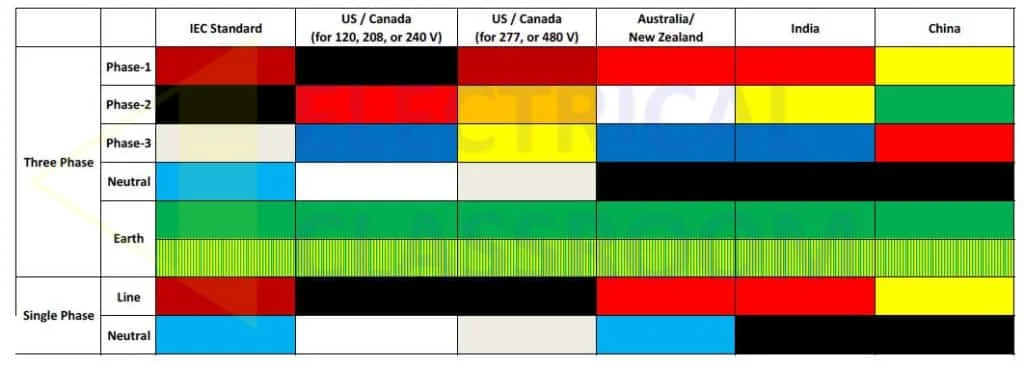
IEC Standard wiring color codes
The international standard, IEC 60446 (International Electro-technical Commission, an organization that prepares and publishes electrical and electronics technologies) defines the color codes as below:
IEC color code for a three-phase AC system,
The preferred wiring color codes for a three phase four wire system is as follows:
- Phase – 1: Brown
- Phase – 2: Black
- Phase – 3: Grey
- Neutral: Light blue
- Earth or protective conductor: Green/Yellow
For a Single-phase AC system,
The preferred wiring color codes for a single-phase four-wire system is as follows:
- Phase: Brown
- Neutral: Light blue
- Earth or protective conductor: Green/Yellow
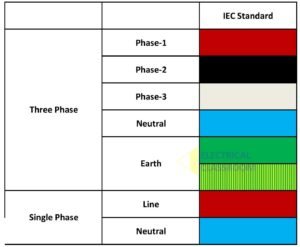
For a 2-Wire Unearthed DC system:
- Positive: Brown
- Negative: Grey
For a 2-Wire Earthed (of a Negative Earthed) DC Circuit system:
- Positive: Brown
- Negative: Blue
For a 2-Wire Earthed (of a Positive Grounded) DC Circuit system:
- Positive: Blue
- Negative: Grey
3-Wire Earthed DC:
- Positive: Brown
- Mid-Wire: Blue
- Negative: Grey
Protective Earth: Green-Yellow
The above-mentioned color codes are followed in the European Union, United Kingdom, China, Hong Kong, Argentina, Russia, Ukraine, Belarus, Kazakhstan and Singapore.
NEC Standard wiring color codes
National Electrical Code is followed in the United States and sometimes in Canada. NEC mandates the color codes for neutral and protective ground as grey and yellow-green respectively. NEC does not instruct any requirements for other conductors. The color code adopted in the US is as follows:
The preferred color codes shall be:
- Phase – 1: Black (for 120, 208, or 240 V), Brown (for 277, or 480 V).
- Phase – 2: Red (for 120, 208, or 240 V), Orange (for 277, or 480 V).
- Phase – 3: Blue (for 120, 208, or 240 V), Yellow (for 277, or 480 V).
- Neutral: White (for 120, 208, or 240 V), or Grey (for 277, or 480 V)
- Earth or protective conductor: Green/Yellow or Green or bare copper conductor.
- For single-phase, Black (for 120V) or Red (for 277) is used for Line and Grey is used for Neutral.
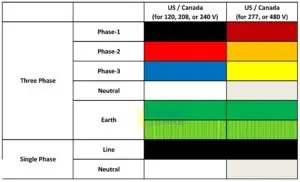
Australian Standard / New Zealand standard for wiring colour codes
AS/NZS prohibits the usage of yellow, green, yellow-green, black, and sky blue colors for phases. Any colors other than the listed can be used. The commonly used color code is as follows:
- For a three-phase supply – Red, white and blue colours are used.
- For a single-phase supply – Red or brown is used for line and black or sky blue is used for neutral.
- For Earth or protective conductor – Green/Yellow or Green or bare copper conductor can be used.
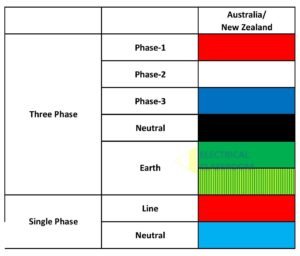
India Standard– single-phase and three phase wire colour code
The electrical wire color code in India is the same as the old UK color codes.
- Phase – 1: Red
- Phase – 2: Yellow
- Phase – 3: Blue
- Neutral: Black
- Earth or protective conductor: Green/Yellow or green or bare conductor

Chinese Standard
- Phase – 1: Yellow
- Phase – 2: Green
- Phase – 3: Red
- Neutral: Black or Blue
- Earth or protective conductor: Green/Yellow or green or bare conductor
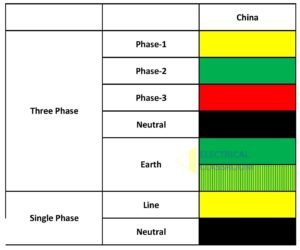
International wiring colors – Old and New Uk wire color codes
European countries abide by International Electrotechnical Commission codes while the USA, Canada, New Zealand, and Australia have their own codes. The United Kingdom was following its British Standard BS 7671 till March 2006, which is followed by a few Asian countries even today.
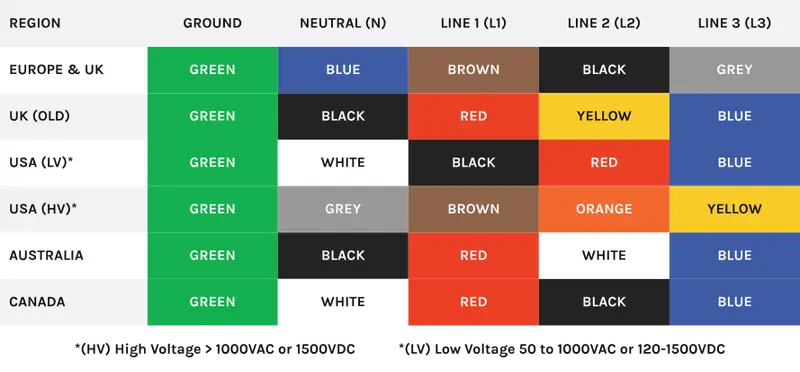
Reference: https://ztlabels.com/standards/dc-power-circuit-wiring-color-codes/
Can diffent colour codes be used in different models of the same car